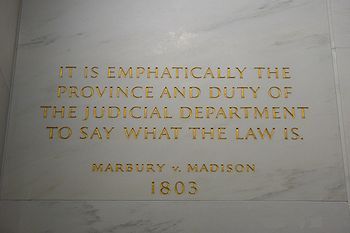Spy Chief James Clapper: We Can’t Stop Another Snowden
Eli Lake, The Daily Beast
02.23.14
He is the nation’s top intelligence officer at a time when the intelligence community is derided because it can’t keep its secrets, and loathed because some of the secrets it has tried to hide concern the same American citizens it was charged with protecting. Thanks to rogue contractor Edward Snowden, the machinations of the shadow bureaucracy Clapper heads have for the last eight months been exposed one news story at a time.
…
Add to this the fact that the legal authority Clapper needs to command the 16 intelligence agencies under his control is murky at best.
And in the last eight months at least, a growing chorus in Congress and the media are calling for him to resign.
…
Not only did Snowden’s first published disclosure expose a major intelligence operation-the collection of millions of call records under section 215 of the Patriot Act. It also led some members of Congress to conclude that Clapper had lied to them. Last March, Clapper was asked in an unclassified hearing by Sen. Ron Wyden, a Democrat from Oregon, whether the National Security Agency collects data on hundreds of millions of Americans. Clapper said no such data was collected “wittingly.” He would later say he misunderstood Wyden’s question and thought he was referring to another classified intelligence program. But the damage was done.
Wyden in a statement told The Daily Beast, “It’s true that no one knows what is going through a witness’s head when they are sitting at the witness table, other than the witness himself. Unfortunately, over the past several years a number of senior officials have repeatedly made misleading and inaccurate statements about domestic surveillance at congressional hearings and in other public settings.” Others are less charitable. Last month Sen. Rand Paul, the libertarian Republican from Kentucky, said if Snowden was to face justice, he should “share a jail cell with James Clapper” for lying to Congress.
…
The Snowden leaks would be horrible to any spy chief, but for a man like Clapper they were particularly horrifying. “This is his life,” said Norton Schwartz, a retired Air Force general who is a friend of Clapper. “This is his community, the thing that he did professionally to defend the nation.”
When Clapper spoke publicly at first about the Snowden disclosures he described the feeling as “literally gut-wrenching.” Here was a man who had spent his life in espionage wars with the Russians, the Viet Cong, and al Qaeda, a man who had spent years railing against leaks. And now, this. “You have to appreciate the sadness that he felt,” Schwartz said. “This was not the result of an act of genius from a foreign intelligence adversary but rather the act of an insider who got past even the most rudimentary of controls.”
And maybe the worst part for Clapper is, he still doesn’t get why Snowden did it. Clapper sees himself as the man who’s opened up the intelligence community to public scrutiny, who keeps the Constitution on his wall, and who’s endured the endless congressional grillings-all while keeping Americans safe. How could Snowden, a fellow intelligence analyst and contractor, not see that? “Maybe if I had I’d understand him better because I have trouble understanding what he did or what he’d do,” the director said. “From my standpoint, the damage he’s done. I could almost accept it or understand it if this were simply about his concerns about so-called domestic surveillance programs. But what he did, what he took, what he has exposed, goes way, way, way beyond the so-called domestic surveillance programs.”
Inside the Mind of James Clapper
By Glenn Greenwald, The Intercept
24 Feb 2014, 7:50 AM EST
It’s been rather amazing to watch not only the standard roster of government-loyal American journalists, but also those who fancy themselves some sort of cynical critics, uncritically regurgitate the government’s evidence-free assertion that Snowden took and then gave to journalists 1.7 million documents. It amazes me because: (1) anyone at this point who is willing to equate evidence-free government assertions with Truth is drowning in some extreme levels of authoritarianism, by definition; and (2) the government clearly has no idea what Snowden took, as report after report has made crystal clear.
…
Recall how House Intelligence Committee Chairman Mike Rogers and former CIA/NSA chief Mike Hayden “joked” at a hearing that Snowden should be put on the U.S. government’s “hit list” and murdered. Last month, BuzzFeed quoted several anonymous Pentagon and intelligence community officials as they laid out their fantasies for how they would like to murder Snowden (“Going back to his flat and he is casually poked by a passerby. He thinks nothing of it at the time starts to feel a little woozy and thinks it’s a parasite from the local water. He goes home very innocently and next thing you know he dies in the shower”). Former CIA chief James Woolsey said “he should be hanged by his neck until he is dead” if convicted of treason, while former UN Ambassador John Bolton revealed an even more detailed fantasy: “My view is that Snowden committed treason, he ought to be convicted of that, and then he ought to swing from a tall oak tree.”
Not only does this underscore the warped pathologies among the glorious leaders of America’s National Security State, but it also highlights the inanity of believing that these kinds of people can and should be trusted with invasive spying powers to be exercised in the dark.
…
It’s hardly surprising that President Obama regards a proven liar as a “straight shooter”. That’s the same President who regards torture-and-rendition-advocating John Brennan as his high moral priest when deciding who should be put on his “kill list”.
But what’s remarkable here is the self-pity on display from Clapper. He’s gone around the country over the last month branding journalists as “accomplices” for the crime of reporting on the NSA without the slightest regard for the effects that this thuggish behavior has on those journalists, their families, and the news-gathering process.
But what’s even more amazing is that Clapper considers himself some sort of victim rather than what he is: the completely undeserving beneficiary of a system of “justice” in which ordinary and powerless people are imprisoned for trivial offenses at greater numbers than any other nation in the world, while those who wield political power, like him, are free to commit crimes without even losing their powerful jobs, let alone being prosecuted for them. James Clapper should look in the mirror every morning and be extremely grateful for the corrupted political system that has shielded him from the consequences of his crimes even as he tries to criminalize others for doing things that the U.S. Constitution guarantees them the right to do.
Instead, he sees himself as the victim. He has medals on his chest and an important national security state position. It is simply outrageous that some people suggest that he has no right to commit felonies, and it’s infuriating that his adult son has to hear some people (almost none in the media) suggest that his criminal conduct should have the same consequences as when ordinary citizens commit less serious crimes. That’s the refusal to accept any personal responsibility, the view of powerful U.S. officials that they are and must be entirely above the law, the obsessive self-regard, that more than anything else has destroyed Washington’s political culture.


 On this day in
On this day in 
